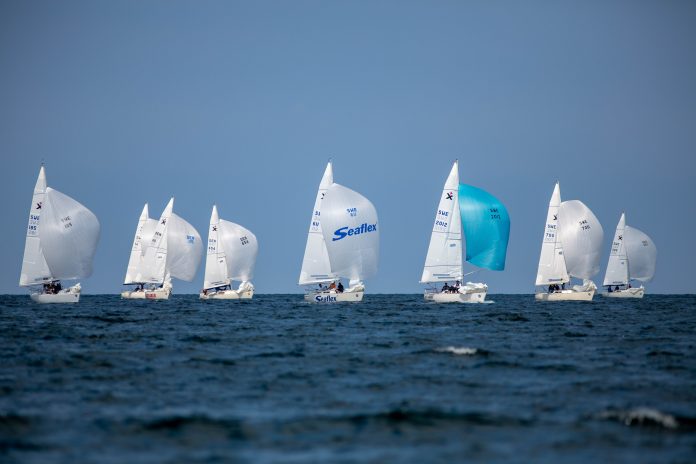
Photo by Jamie Morrison

Sailing races are lost not won and it’s the competitors who make the fewest mistakes that end up on top.
The mistakes that we make don’t go away on their own and as sailors we tend to make the same mistakes week after week. Making notes during races about what worked and what didn’t will ensure that mistakes on the course will be lessened.
Refer to the notes regularly, practice what you have learned and your chances of improving your results will be greatly enhanced.
The main cause of most of our mistakes is either carelessness or greed.
Examples of Carelessness or Greed
- Being OCS
- Being caught in the 3rd or 4th row at a start
- Slightly underlaying a weather mark when approaching in a group of boats.
- Hitting a Mark
- Fouling another boat when it could have been easily avoided
- Having a breakage which could have been avoided by a simple prerace check.
- Not knowing the course when in the lead
- Not getting out on the course early enough to establish any current.
- Getting outside other boats at a mark rounding.
- Overlaying a mark.
- Poor boat handling due to insufficient practice time.
Ways To Overcome Mistakes
Firstly you must want to improve your racing results. Like most things in life, it will take energy and work to achieve improvement. Be aware that there is a risk that you will try hard, improve and then plateau.
As you get better, there is a tendency for most sailors to relax, believing that they will continue on their upwards trajectory.
The first step to overcoming the plateauing is to identify your strengths and weaknesses. Get the notebook out that I referred to earlier and get together with your crew. Read what you wrote at earlier events and commit to fixing the mistakes you made.
Think back to recent regattas or races and list out the things that you do well. Then list all the things that you feel are holding you back, keeping them on separate pages.
At subsequent races and regattas, add and subtract things on each list as further weaknesses or improvements are identified.
Sometimes a simple recording on your phone can be made while you are driving home. This is best done while the days event is still fresh in your mind and you can simply transcribe it into your notebook at a later time.
Ideas to Reduce Mistakes
- Write a list on your boat of things that you need to remember and in what order. An example could be the order of things that need to happen at the leeward mark. This would be written on the deck next to the mast.
- Write reminders on the relevant parts of the boat. An example is a reminder to pull on the vang again as you start upwind again.
- Have notes on the boom which might say things like, “Flat is Fast”. This reminds you to ease the sheet if you are overpowered. “Compass” to remind you to keep an eye on the heading for wind shifts.
- Have a briefing before heading out to race and go through the problems that you are going to work on during the event.
- Think of the things that you need to work on and create reminders to help you when you might be distracted by the pressure of the race.
Once on the Course
There are 3 important attributes to success and they are:
Concentration – Even when you know the mistakes not to make, you have to think about them continually not to make them. Don’t be distracted by other competitors, unmotivated teammates or your internal fears such as fear of heavy weather.
Common Sense – Don’t take unnecessary risks such as pushing your luck in the zone. The few metres that you gain will be far outweighed by any penalty you may incur. Greed is the cause of most big mistakes and given the choice of several alternatives, let common sense be your guide.
Anticipation – This is the ability to think ahead to what happens next. As an example, at a coming mark rounding, look ahead and take note of other boats approaching on Port and Starboard. Consider what they may do and how it could affect your approach.
Think through possible scenarios and have a plan for how you will tackle each outcome.

